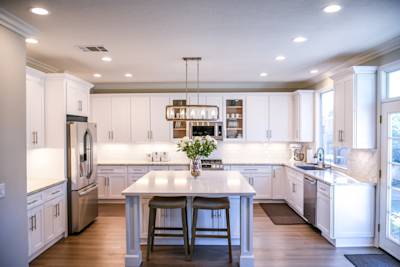
The Do's and Don'ts of Hosting an Open House
Your Beginner’s Guide to Hosting a Successful Open House

Your Beginner’s Guide to Hosting a Successful Open House

Jacqueline Kyo Thomas
Hosting an open house? Don’t make unnecessary mistakes that will cost you time, money, or even your well-being. In this beginner-friendly guide, we’ll discuss everything you need to know to make your open house a success.
Before we get into the do’s and don’ts, let’s discuss the benefits of hosting an open house. And yes, the pros outweigh the cons.
Some real estate agents absolutely detest open houses. They say that hosting an open house is a waste of time because it rarely results in a sale. Plus, there are security risks to consider.
While it’s true that very few open houses result in an on-site offer, that doesn’t mean you shouldn’t host one.
Just like Facebook ads and lawn signs, open houses are an integral part of an aggressive home marketing strategy. Research also shows that, on a nation-wide average, homes with open houses sell for $9,000 more and spend seven days less time on the market. This research indicates that open houses can trigger FOMO (fear of missing out), which motivates buyers to act quickly when they see a home they want to buy. This is also what you need to close the deal at asking (or above!).
Your open house isn’t a failure just because you don’t get an offer the evening of. With a strong follow-up strategy, you can continue to nurture your leads until they’re ready to make an offer (or ask for your help in looking for another home).
Open houses increase exposure, which is always a good thing. The more people you can reach, the better your chances of getting the home sold.
TL;DR?
Of course, some open houses are more successful at doing the above than others, but it’s not because of magic. You can expect the same results by following the below do’s and don’ts.
Before opening a house for the general population… Before listing it “for sale”… host a private preview for brokers, agents, and other industry professionals. This special showing allows your real estate colleagues to check out the property before it hits the market. Not only will you get the opportunity to generate buzz about your property, you can also find out if others think that your property is well-priced for the area. Use their feedback to improve your listing, and take every opportunity to expand your professional network.
Serve refreshments and have plenty of property detail sheets available for agents to take.
After putting in all of this work to ensure your open house is a success, don’t forget to market it. Otherwise, no one’s actually going to attend your open house event. Here’s where to market your open house:
What’s worse than a dirty house? Nada. For a house hunter, there’s nothing worse than the prospect of cleaning up someone else’s dirty home. No matter how wonderful the property, few buyers can see beyond the cobwebs and stained carpet. Advise the homeowners to either do a deep clean on their home or hire a service to do it for them. Now’s the time to shampoo carpets, de-grease the oven vent, and dust the ceiling fans. Offer a deep clean checklist as a courtesy to your homeowners.
In addition to deep cleaning, the home should also be de-cluttered. Get rid of furniture that’s unnecessary or redundant (i.e. two sofas in one living room). Make a room appear more spacious by getting rid of clutter.

Now that you’re working with the bare basics, stage the property. First, arrange the furniture to define each room’s purpose. Next, add finishing touches to make the property feel fresh, clean, and approachable. For example: Add a bouquet of fresh flowers to the living room, open the curtains, and turn on all of the lights (and lamps). Also, play soft music in the background to reduce awkward silence.
Here’s everything you need to know about staging a home to sell.
Print out property description sheets and make them available to all who attend your open house. On your sheet, include the following:
It’s also essential to disclose that you’re the seller’s agent on your property description sheet.
Now that we’ve looked at the most important things to do for your open house, let’s look at things to avoid.
Sellers may want to stay close by during the open house. Don’t let them.
Best-case scenario: They’ll get in the way.
Worst-case scenario: They’ll let their desperation show.
It’s difficult for buyers to picture themselves in the home when the current homeowner is lurking around the corner. Buyers are more inhibited and less likely to thoroughly inspect the home out of deference to the owner.
Current homeowners also have a tendency to talk too much. They can show their hand and let the prospective buyer know that they’re willing to accept a lower price.
To control the environment, eliminate the wild-cards. Say goodbye to Rover and Felix, too. Beloved pets shouldn’t be present at the event.
If you host your open house at the wrong time, you will waste your time.
Most successful events occur on the weekends, during the day (between 11 am to 5 pm). Attendance during weekdays (even evenings) will be sparse at best. House hunters are too busy with work, school, or other errands during the week to attend an open house. Also, avoid hosting an open house in inclement weather, such as rain or snow. While it may be possible to attend during bad weather, few people will want to. Other times to avoid include holidays and major sporting events, like the Super Bowl.
The property may be fresh and clean on the inside, but what does it look like on the outside? First impressions matter. Ask the homeowner to invest in the property’s exterior, including:
Not every property is a good candidate for an open house. Here’s a quick quiz to determine if you should do an open house:
If most of your answers were “yes,” then go forward with an open house.

While it may be tempting to light a few candles and plug-in fragrances strategically throughout the home, don’t do it. Not everyone likes the same fragrance that you may, and it can be a huge turnoff to your potential buyer. Some people are even allergic to artificial air fresheners.
Instead of relying on synthetic fragrances, consider these tricks:
Here is the most important takeaway from this list:
Stay in touch with your open house attendees after the event.
Firstly, be sure to collect your visitor’s name, contact information, and vehicle details before touring the property. You're required to be able to inform the seller who saw their house, and need this information for your client. It’s also a good practice to make a copy of their government-issued ID.
Plus, thanks to your sign up sheet, you have their information. Follow up with them. Within 48 hours after the open house event, call and thank everyone who attended. Also, ask if they have any questions about the property.
And don’t let that be your last communication with your prospect. Continue reaching out to the prospect and offer your services in case they need help finding a different home.
A successful open house doesn’t happen by accident. By implementing the above do’s (and avoiding the don’ts), you can reap the most benefits from your open house.